- About Us
- Columns
- Letters
- Cartoons
- The Udder Limits
- Archives
- Ezy Reading Archive
- 2024 Cud Archives
- 2023 Cud Archives
- 2022 Cud Archives
- 2021 Cud Archives
- 2020 Cud Archives
- 2015-2019
- 2010-2014
- 2004-2009
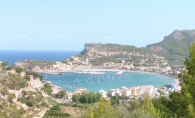 |
Escapism In Mallorca |
The mere suggestion of certain place names evokes heady thoughts of decadence, excess and escape – none more so than Mallorca. Australians in particular wonder about the exotic Mediterranean island, after Christopher Skase spent his final ten fugitive years there before his death in August 2001. In fact a local barman working at a predominantly topless beach club on Mallorca’s southern coast confirmed that wherever he travelled in the world, every Australian that he met knew of his home island. 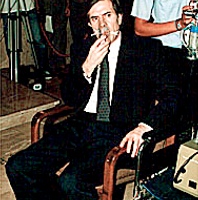 After my own ‘less-fugitive’ (but equally escapist) week there in June for a wedding, it became apparent that it is not just rogue Australian businessmen who seek out the debauchery of Spain’s Balearic Islands. Mallorca, along with its neighbours of Menorca and Ibiza have created a clichéd and extravagant party lifestyle that enthrals many millions, the majority of whom live in Europe – far closer than the Antipodes – as my days of transit attested.
After my own ‘less-fugitive’ (but equally escapist) week there in June for a wedding, it became apparent that it is not just rogue Australian businessmen who seek out the debauchery of Spain’s Balearic Islands. Mallorca, along with its neighbours of Menorca and Ibiza have created a clichéd and extravagant party lifestyle that enthrals many millions, the majority of whom live in Europe – far closer than the Antipodes – as my days of transit attested.
Like much of the tourist world, Mallorca thrives on Bacchanalian British and German festivities. This was particularly fitting in June this year, as the Football World Cup played out across TV screens in bars across the island – with not just a Spanish win and a psychic octopus (presumably now bound for a Spanish tapas plate), but the quarter final between the ‘old enemies.’
I had been warned that the pubs and bars of Mallorca’s coastal Magaluf area were the worst collection of boorish British CHAVs (‘council housing and violent’ or other explanation) to be found anywhere. Clearly that made it a contender as a stopover for a bucks day, but the fact that it was sufficiently awful for a bucks party to leave after only an hour, is probably the most damning indictment an ‘entertainment area’ could receive. Moving away from the imitation British pubs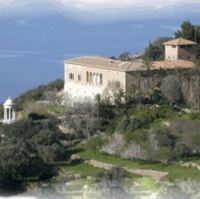 , appalling haircuts, sun burn and Man Utd tattoos, the bucks’ party retreated to the charming streets of Palma – the capital of Mallorca – to reveal stone alleyways with tapas bars, beautiful Spanish speakers and a hint of the island’s more ancient past.
, appalling haircuts, sun burn and Man Utd tattoos, the bucks’ party retreated to the charming streets of Palma – the capital of Mallorca – to reveal stone alleyways with tapas bars, beautiful Spanish speakers and a hint of the island’s more ancient past.
The stone architecture of Palma continued the Bacchanalian theme however, as the Romans had occupied Mallorca for 500 years until the Vandals over ran it during the sixth century (a historical parallel with the Magaluf Lager Louts perhaps). Not long after, and like much of the rest of Spain, the Moors conquered the island in 902 and then lost it to the Christian Kings in the 1200s. A famous observer of Mallorca’s history was the British classicist Robert Graves, who made the island his literary home for fifty years until he died in 1985. Aside from writing his Roman and Greek translations, works of poetry and the renowned I, Claudius and Claudius the God, Graves also maintained the behaviour expected of foreigners in Mallorca and lived a louche existence with various wives in the northern town of Deia.
Coincidentally, it was Deia that had drawn a crowd of predominantly English and Australian revellers for a magnificent wedding looking out from the stone monastery of Son Marroig, west to the sun setting into the Mediterranean, with strains of flamenco guitar and ‘ambitious’ dancing in the background. Excessive behaviour was almost pre-ordained considering the location – even the groom was unapologetically bad.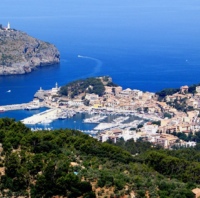
And so for five days including the ‘nuptials,’ a number of the wedding guests (myself included) retreated to the idyllic Port de Soller, on Mallorca’s northern coast. On an island characterised by ‘retreat and escape,’ we managed to retreat and escape further still – away from Palma, Magaluf and the madding crowd of southern Mallorca beyond the Tramuntana Range, which rises 1400m above sea level and divides the island.
While Port de Soller caught my eye for its marina, bars and twin lighthouses guarding the harbour, evidently it also caught Franco’s eye, as it housed Nationalist submarines 75 years earlier during the Spanish Civil War. Interestingly on one of our ‘recreation days,’ when out in a hired motor boat in unusually disturbed Mediterranean waters, our driver became similarly disturbed when describing the Battle of Mallorca.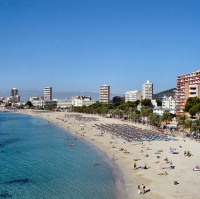 As he told the story, the Republican attack of September 1936 was repelled with Fascist Italian air support, leaving Mallorca as a Nationalist stronghold for the rest of the war. A subsequent kayaking trip along the northern coast revealed the resistance caves and clandestine stores of the war – something seemingly as distant now as the Roman, Vandals and Moors to those who live in this paradise.
As he told the story, the Republican attack of September 1936 was repelled with Fascist Italian air support, leaving Mallorca as a Nationalist stronghold for the rest of the war. A subsequent kayaking trip along the northern coast revealed the resistance caves and clandestine stores of the war – something seemingly as distant now as the Roman, Vandals and Moors to those who live in this paradise.
Upon return to Australia, I realised that not all of Mallorca’s sports are nocturnal nor foreign, as the island is home to both Rafael Nadal (who won Wimbledon the following week) and Jorge Lorenzo (who won another World MotoGP race). Presumably Nadal and Lorenzo still manage to enjoy themselves in Mallorca though, bathing in the warm Mediterranean sun, waters and indulgences - where the senses can be easily and sensually filled.
Back now from the northern summer and the warm largesse of the Balearic Islands, to a southern winter where the celebrities are no longer parading past, the tan and hangover have both faded and the dreamy refuge is consigned to a Graves-like mythology, it seemed appropriate to reflect on the title Robert Graves chose for his early biography ...
... Goodbye to all that.
